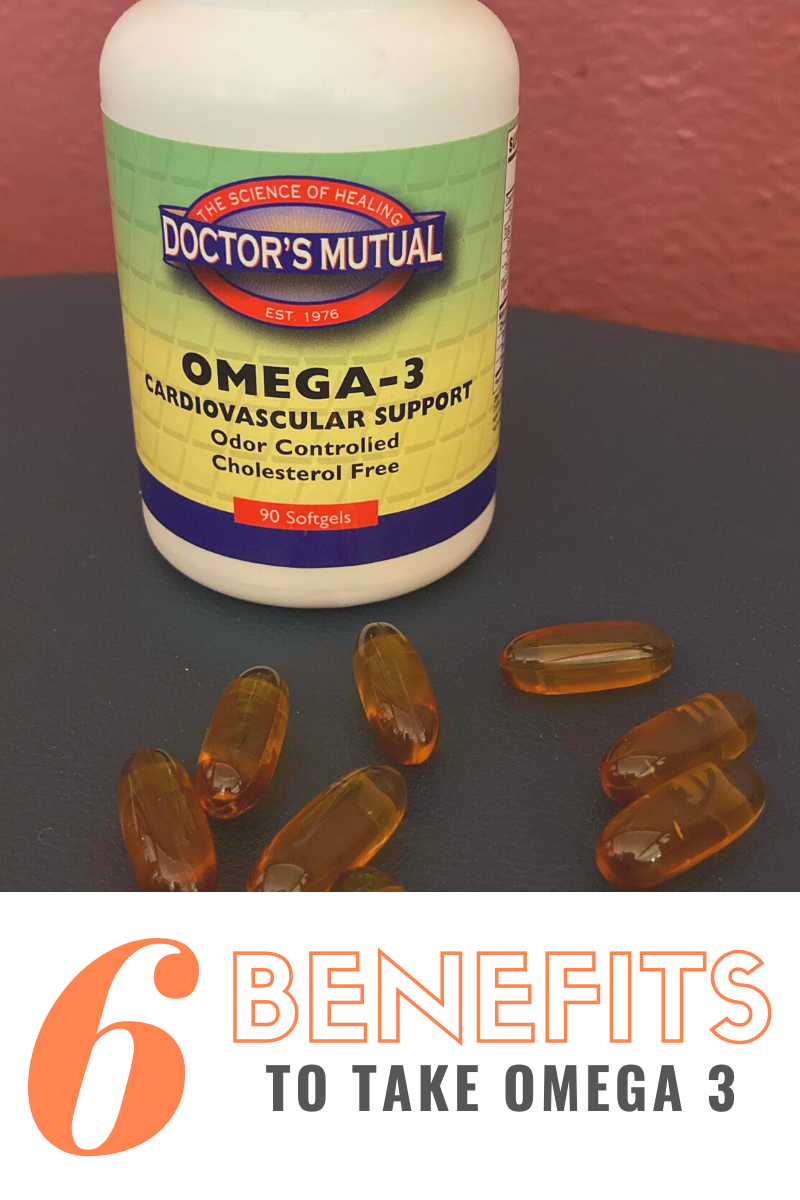6 Reasons to Take Omega 3s
Do you know if you are getting enough omega 3s? Most people don’t even think about things like omega 3 or 6. With our diet in the United States, we get way more 6s than we do 3s! Where do 3 and 6 come from? Omega 3s come from things like flax seeds, fish and fish oils, while omega 6s come from corn, corn oil and safflower oil.

There are three types of Omega-3 fatty acids that are important for human physiology. They are polyunsaturated fatty acids, which means that their chemical structure has several double bonds, which makes them more stable and they are widely distributed in nature and are found in both plants and animals. EPA and DHA are commonly found in marine oils, with marine algae and phytoplankton as their primary source. However they can also be found in meat, eggs and dairy from grass-fed animals.
The third type, alpha linolenic acid (ALA), is found in plant oils such as flaxseed oil, and can also be found in other plant based foods such as soybean products or walnuts. Therefore, not all Omega-3s are found in fish oil, but out of the three that are relevant to us, only EPA and DHA can be gained from marine based oils such as fish oil.
Humans are not able to produce these essential fatty acids themselves, so it is crucial to include them in our diet by eating oily fish or making sure we top up our Omega-3 intake with a food supplement. Learn more about which products provide abundant amounts of Omega-3 fatty acids. However if you are not sure if you can cover the recommended amount of Omega-3 through your diet alone, it might be worth looking into a high quality Omega-3 food supplement such as Omega 3 of Norway.
6 Benefits
- Fights Depression and Anxiety: Depression is one of the most common mental disorders and is characterized by sadness, lethargy and a general loss of interest in life. Anxiety, on the other hand is characterized by constant worry and nervousness. When people start taking omega-3 supplements, their symptoms improve. There are three types of omega-3 fatty acids: Alpha-linolenic acid (ALA), eicosapentaenoic acid (EPA) and Docosahexaenoic acid (DHA). Of the three, EPA appears to be the best at fighting depression. One study even found EPA as effective against depression as a common antidepressant drug.
2. Eye health: DHA is a major structural component of the retina of your eye. When you don’t get enough DHA, you can have vision problems. If you get enough omega-3 you can reduced your risk of macular degeneration, which is a leading cause of permanent eye damage and blindness.
3. ADD/ADHD: Attention deficit hyperactivity disorder (ADHD) is a behavioral disorder characterized by inattention, hyperactivity and impulsivity. Several studies note that children with ADHD have lower blood levels of omega-3 fatty acids than children without ADHD. Omega-3s help improve inattention and task completion and decrease hyperactivity, impulsiveness, restlessness and aggression. Recently, researchers observed that fish oil supplements were one of the most promising treatments for ADHD.
4. Fights inflammation: Inflammation is the body’s response to infections and damage in your body. However, inflammation sometimes persists for a long time, even without an infection or injury. This is called chronic or long-term inflammation. Long-term inflammation can contribute to almost every chronic illness. Omega-3 fatty acids can reduce the production of molecules linked to inflammation. Studies have consistently observed a connection between higher omega-3 intake and reduced inflammation.
5. Relives menstrual pain: Menstrual pain can occur in your lower abdomen and pelvis and often radiates to your lower back and thighs. Studies repeatedly prove that women who consume the most omega 3s have milder menstrual pain. One study even determined that an omega 3 supplement was more effective than ibuprofen in treating severe pain during menstruation.
6. Fights autoimmune diseases: In autoimmune diseases, your immune system mistakes healthy cells for foreign cells and starts attacking them. Studies show that getting enough omega 3s during your first year of life is linked to a reduced risk of many autoimmune diseases, including type 1 diabetes, autoimmune diabetes and multiple sclerosis. Omega-3s also help treat lupus, rheumatoid arthritis, ulcerative colitis, Crohn’s disease and psoriasis.
Chiropractic
When you start to notice something is wrong, those symptoms are only 10% of what the body is actually doing. (Symptoms are always last! You have to have a break down in the system before you notice something is wrong first.) The other 90% is changing your posture, sending inflammation into your body and sending stress hormones into your body which produces dysfunction.
The chiropractic adjustment along with whole foods and supplementation can drastically change your life. (Diet, water, rest, all the things.) Don’t put off today what can help you tomorrow. An ounce of prevention is worth a pound of cure! Give us or a chiropractor near you a call to put you on the road to health.



